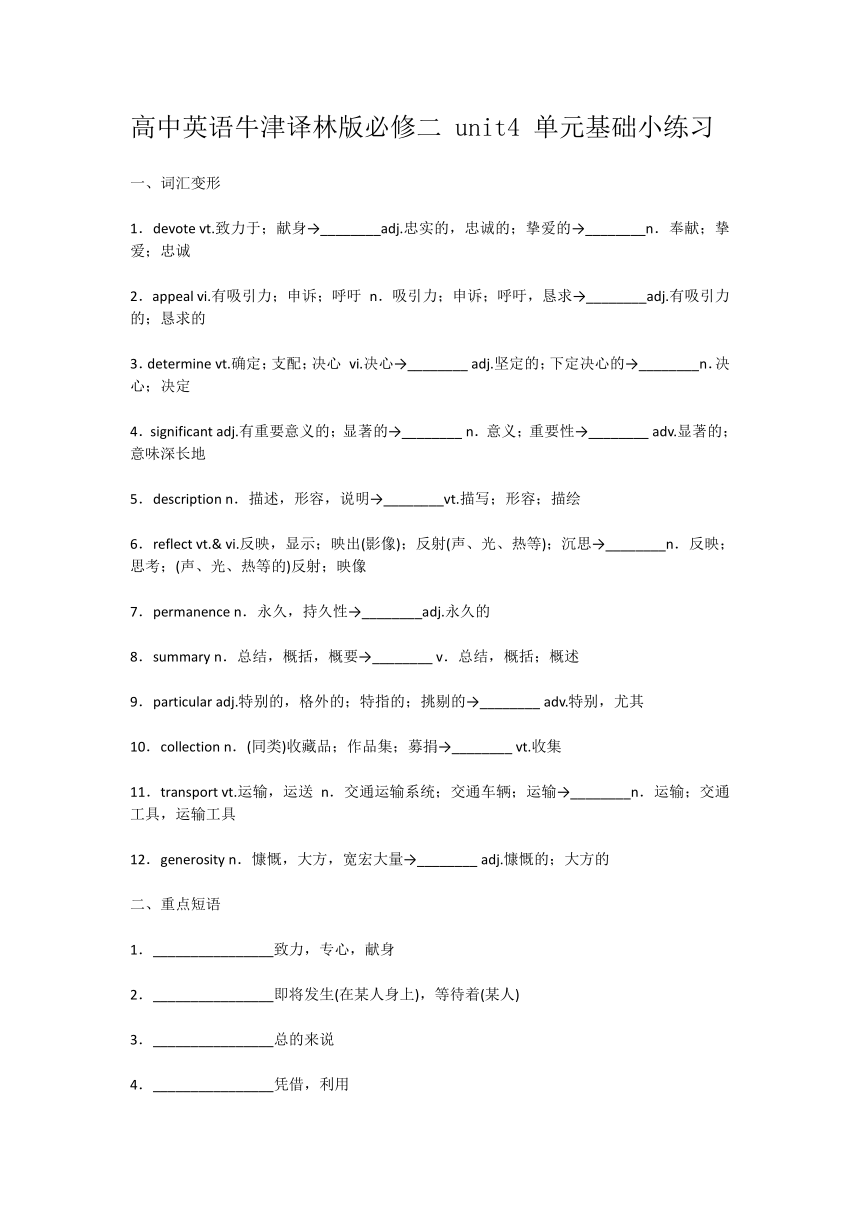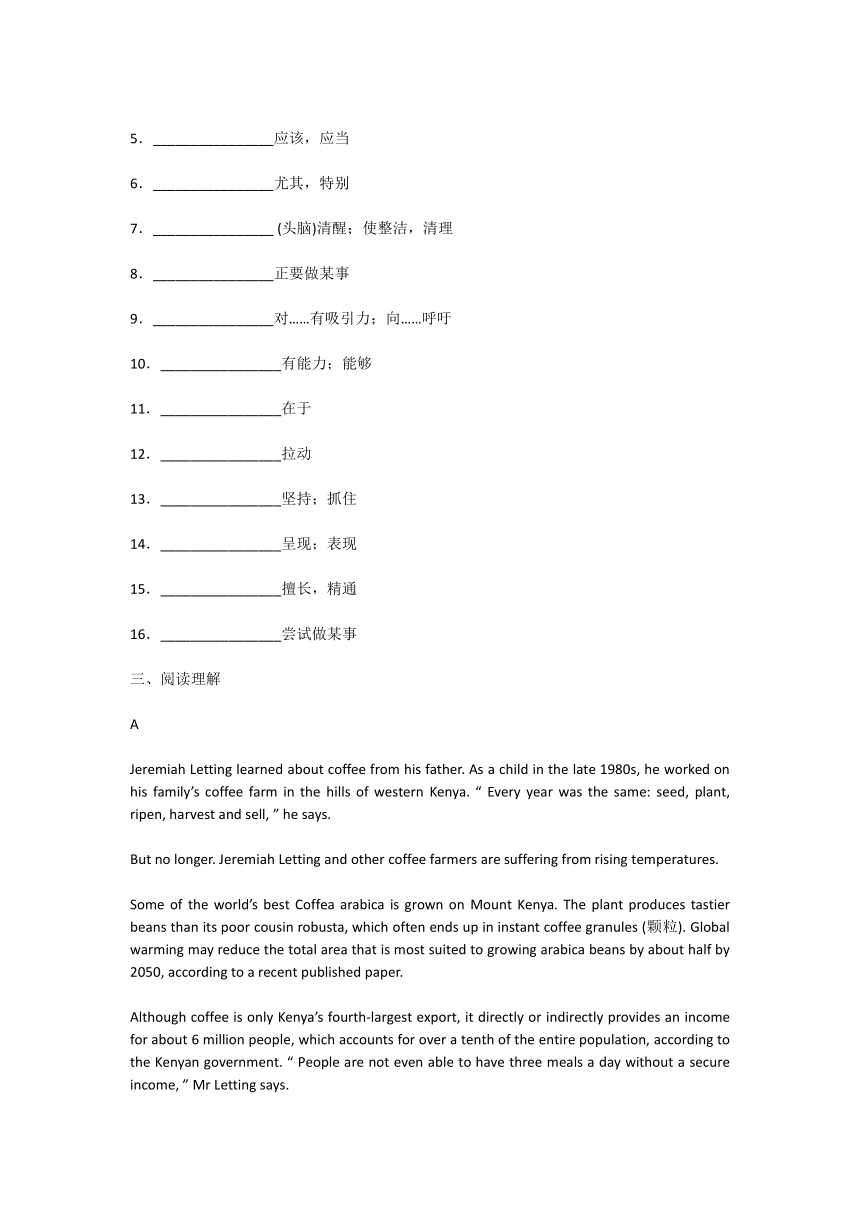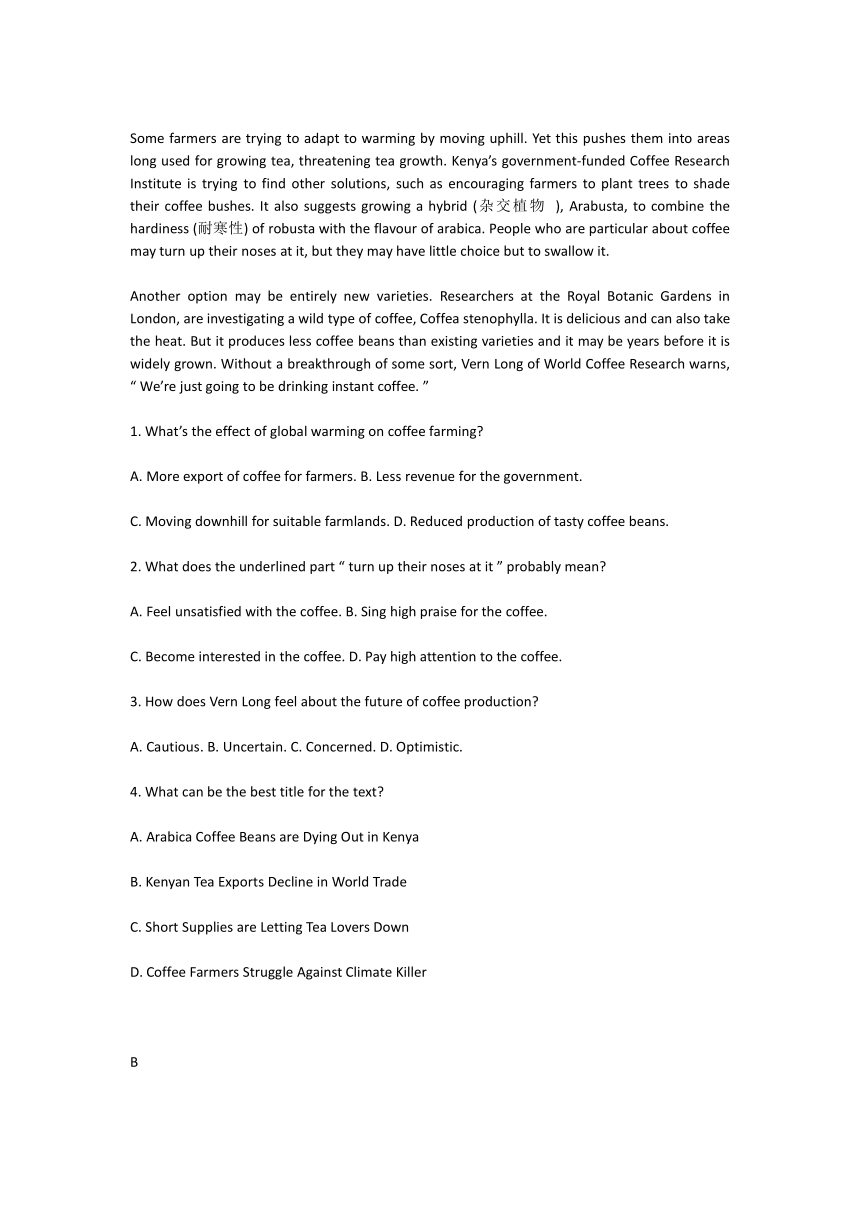牛津译林版(2019)必修二 unit4Exploring literature 单元基础小练习(有答案)
文档属性
| 名称 | 牛津译林版(2019)必修二 unit4Exploring literature 单元基础小练习(有答案) |

|
|
| 格式 | zip | ||
| 文件大小 | 15.0KB | ||
| 资源类型 | 教案 | ||
| 版本资源 | 牛津译林版(2019) | ||
| 科目 | 英语 | ||
| 更新时间 | 2022-10-07 14:31:03 | ||
图片预览



文档简介
高中英语牛津译林版必修二 unit4 单元基础小练习
一、词汇变形
1.devote vt.致力于;献身→________adj.忠实的,忠诚的;挚爱的→________n.奉献;挚爱;忠诚
2.appeal vi.有吸引力;申诉;呼吁 n.吸引力;申诉;呼吁,恳求→________adj.有吸引力的;恳求的
3.determine vt.确定;支配;决心 vi.决心→________ adj.坚定的;下定决心的→________n.决心;决定
4.significant adj.有重要意义的;显著的→________ n.意义;重要性→________ adv.显著的;意味深长地
5.description n.描述,形容,说明→________vt.描写;形容;描绘
6.reflect vt.& vi.反映,显示;映出(影像);反射(声、光、热等);沉思→________n.反映;思考;(声、光、热等的)反射;映像
7.permanence n.永久,持久性→________adj.永久的
8.summary n.总结,概括,概要→________ v.总结,概括;概述
9.particular adj.特别的,格外的;特指的;挑剔的→________ adv.特别,尤其
10.collection n.(同类)收藏品;作品集;募捐→________ vt.收集
11.transport vt.运输,运送 n.交通运输系统;交通车辆;运输→________n.运输;交通工具,运输工具
12.generosity n.慷慨,大方,宽宏大量→________ adj.慷慨的;大方的
二、重点短语
1.________________致力,专心,献身
2.________________即将发生(在某人身上),等待着(某人)
3.________________总的来说
4.________________凭借,利用
5.________________应该,应当
6.________________尤其,特别
7.________________ (头脑)清醒;使整洁,清理
8.________________正要做某事
9.________________对……有吸引力;向……呼吁
10.________________有能力;能够
11.________________在于
12.________________拉动
13.________________坚持;抓住
14.________________呈现;表现
15.________________擅长,精通
16.________________尝试做某事
三、阅读理解
A
Jeremiah Letting learned about coffee from his father. As a child in the late 1980s, he worked on his family’s coffee farm in the hills of western Kenya. “ Every year was the same: seed, plant, ripen, harvest and sell, ” he says.
But no longer. Jeremiah Letting and other coffee farmers are suffering from rising temperatures.
Some of the world’s best Coffea arabica is grown on Mount Kenya. The plant produces tastier beans than its poor cousin robusta, which often ends up in instant coffee granules (颗粒). Global warming may reduce the total area that is most suited to growing arabica beans by about half by 2050, according to a recent published paper.
Although coffee is only Kenya’s fourth-largest export, it directly or indirectly provides an income for about 6 million people, which accounts for over a tenth of the entire population, according to the Kenyan government. “ People are not even able to have three meals a day without a secure income, ” Mr Letting says.
Some farmers are trying to adapt to warming by moving uphill. Yet this pushes them into areas long used for growing tea, threatening tea growth. Kenya’s government-funded Coffee Research Institute is trying to find other solutions, such as encouraging farmers to plant trees to shade their coffee bushes. It also suggests growing a hybrid (杂交植物 ), Arabusta, to combine the hardiness (耐寒性) of robusta with the flavour of arabica. People who are particular about coffee may turn up their noses at it, but they may have little choice but to swallow it.
Another option may be entirely new varieties. Researchers at the Royal Botanic Gardens in London, are investigating a wild type of coffee, Coffea stenophylla. It is delicious and can also take the heat. But it produces less coffee beans than existing varieties and it may be years before it is widely grown. Without a breakthrough of some sort, Vern Long of World Coffee Research warns, “ We’re just going to be drinking instant coffee. ”
1. What’s the effect of global warming on coffee farming
A. More export of coffee for farmers. B. Less revenue for the government.
C. Moving downhill for suitable farmlands. D. Reduced production of tasty coffee beans.
2. What does the underlined part “ turn up their noses at it ” probably mean
A. Feel unsatisfied with the coffee. B. Sing high praise for the coffee.
C. Become interested in the coffee. D. Pay high attention to the coffee.
3. How does Vern Long feel about the future of coffee production
A. Cautious. B. Uncertain. C. Concerned. D. Optimistic.
4. What can be the best title for the text
A. Arabica Coffee Beans are Dying Out in Kenya
B. Kenyan Tea Exports Decline in World Trade
C. Short Supplies are Letting Tea Lovers Down
D. Coffee Farmers Struggle Against Climate Killer
B
Zoologists studied the nervous systems of insects to investigate principles of biological brain computation and possible effects on machine learning and artificial intelligence. Specifically, they analysed how insects learn to associate sensory information in their environment with a food reward, and how they can recall this information later in order to solve complex tasks such as the search for food.
Living organisms show remarkable abilities in coping with problems posed by complex and dynamic environments. They are able to generalize their experiences in order to rapidly adapt their behaviour when the environment changes. The zoologists investigated how the nervous system of the fruit fly controls its behaviour when searching for food.
Using a computer model, they simulated and analysed the computations in the fruit fly’s nervous system in response to scents (气味) coming from the food source. They initially trained their model of the fly brain in exactly the same way as insects are trained in experiments. They presented a specific scent in the simulation together with a reward and a second scent without a reward.
“The model rapidly learns a strong representation of the rewarded scent after just a few scent presentations and is then able to find the source of this scent in a complex environment,” said computer scientist Dr Hannes Rapp, who created the model.
The model created is thus capable to generalize from its memory and to apply what it has learned previously in a completely new and complex environment, while learning required only a very small database of training samples.
The results suggest that the transformation of sensory information into memories in the brain can inspire future machine learning and artificial intelligence applications to solving complex tasks.
1. What is the ultimate aim of the research
A. To investigate principles of biological brain computation.
B. To solve problems in simulated complex environments.
C. To analyse how insects search for food in complex environment.
D. To promote machine learning and AI applications.
2. How did zoologists mainly carry out their research
A. By observing fruit flies. B. By performing lab experiments.
C. By using a computer model. D. By carrying out field research.
3. What is mainly discussed about the study in paragraphs 3-5
A. Its findings. B. Its process. C. Its importance. D. Its application.
4. What does the result of this study imply
A. Artificial intelligence is applied to the study of insect brain.
B. Food reward is connected with information transformation.
C. Sensory information can be applied to solving complex tasks.
D. Studying living organisms can make a difference to AI research.
三、写作:
上周末,你和同学参加了一次采摘活动。请你为班级英语角写一篇短文,介绍这次活动,内容包括:
1. 农场情况;
2. 采摘过程;
3. 个人感受
注意:
1. 词数100左右;
2. 题目已为你写好。
题目:My Weekend
____________________________________________________________________________________________________________________________________________________________________________________________________________________________________________________________________________________________________________________________________________________________________________________________________________________________________________________________________________________________________________________________________________________________________________________________________________________________________________________________________
答案:
一、词汇变形
1.devote vt.致力于;献身→devoted adj.忠实的,忠诚的;挚爱的→devotion n.奉献;挚爱;忠诚
2.appeal vi.有吸引力;申诉;呼吁 n.吸引力;申诉;呼吁,恳求→appealing adj.有吸引力的;恳求的
3.determine vt.确定;支配;决心 vi.决心→determined adj.坚定的;下定决心的→determination n.决心;决定
4.significant adj.有重要意义的;显著的→significance n.意义;重要性→significantly adv.显著的;意味深长地
5.description n.描述,形容,说明→describe vt.描写;形容;描绘
6.reflect vt.& vi.反映,显示;映出(影像);反射(声、光、热等);沉思→reflection n.反映;思考;(声、光、热等的)反射;映像
7.permanence n.永久,持久性→permanent adj.永久的
8.summary n.总结,概括,概要→summarise v.总结,概括;概述
9.particular adj.特别的,格外的;特指的;挑剔的→particularly adv.特别,尤其
10.collection n.(同类)收藏品;作品集;募捐→collect vt.收集
11.transport vt.运输,运送 n.交通运输系统;交通车辆;运输→transportation n.运输;交通工具,运输工具
12.generosity n.慷慨,大方,宽宏大量→generous adj.慷慨的;大方的
二、重点短语
1.devote oneself to致力,专心,献身
2.in store (for sb.)即将发生(在某人身上),等待着(某人)
3.in summary总的来说
4.draw on凭借,利用
5.ought to应该,应当
6.in particular尤其,特别
7.clear up (头脑)清醒;使整洁,清理
8.be on the point of doing sth.正要做某事
9.appeal to对……有吸引力;向……呼吁
10.be capable of有能力;能够
11.lie in 在于
12.pull on拉动
13.hold on坚持;抓住
14.take on呈现;表现
15.be good at擅长,精通
16.attempt to do sth.尝试做某事
阅读
A篇:【答案】1. D 2. C 3. C 4. B
B 篇:【答案】1. D 2. C 3. B 4. C
写作
My Weekend
Last weekend,we took part in a picking activity. We drove from the school, and the farm was about 2 kilometers away from our school. When we arrived at the farm, there are all kinds of animals, green fresh vegetables and fruit trees in the farm. We were divided into two groups. One group was responsible for picking fruits, the other packed up the fruits. Time flying quickly, the activity was over. But it was a meaningful day, when we learn a lot form it. Through this activity, we know how hard the farmers are and how precious the food is. We should treasure the food planted by the farmers.
一、词汇变形
1.devote vt.致力于;献身→________adj.忠实的,忠诚的;挚爱的→________n.奉献;挚爱;忠诚
2.appeal vi.有吸引力;申诉;呼吁 n.吸引力;申诉;呼吁,恳求→________adj.有吸引力的;恳求的
3.determine vt.确定;支配;决心 vi.决心→________ adj.坚定的;下定决心的→________n.决心;决定
4.significant adj.有重要意义的;显著的→________ n.意义;重要性→________ adv.显著的;意味深长地
5.description n.描述,形容,说明→________vt.描写;形容;描绘
6.reflect vt.& vi.反映,显示;映出(影像);反射(声、光、热等);沉思→________n.反映;思考;(声、光、热等的)反射;映像
7.permanence n.永久,持久性→________adj.永久的
8.summary n.总结,概括,概要→________ v.总结,概括;概述
9.particular adj.特别的,格外的;特指的;挑剔的→________ adv.特别,尤其
10.collection n.(同类)收藏品;作品集;募捐→________ vt.收集
11.transport vt.运输,运送 n.交通运输系统;交通车辆;运输→________n.运输;交通工具,运输工具
12.generosity n.慷慨,大方,宽宏大量→________ adj.慷慨的;大方的
二、重点短语
1.________________致力,专心,献身
2.________________即将发生(在某人身上),等待着(某人)
3.________________总的来说
4.________________凭借,利用
5.________________应该,应当
6.________________尤其,特别
7.________________ (头脑)清醒;使整洁,清理
8.________________正要做某事
9.________________对……有吸引力;向……呼吁
10.________________有能力;能够
11.________________在于
12.________________拉动
13.________________坚持;抓住
14.________________呈现;表现
15.________________擅长,精通
16.________________尝试做某事
三、阅读理解
A
Jeremiah Letting learned about coffee from his father. As a child in the late 1980s, he worked on his family’s coffee farm in the hills of western Kenya. “ Every year was the same: seed, plant, ripen, harvest and sell, ” he says.
But no longer. Jeremiah Letting and other coffee farmers are suffering from rising temperatures.
Some of the world’s best Coffea arabica is grown on Mount Kenya. The plant produces tastier beans than its poor cousin robusta, which often ends up in instant coffee granules (颗粒). Global warming may reduce the total area that is most suited to growing arabica beans by about half by 2050, according to a recent published paper.
Although coffee is only Kenya’s fourth-largest export, it directly or indirectly provides an income for about 6 million people, which accounts for over a tenth of the entire population, according to the Kenyan government. “ People are not even able to have three meals a day without a secure income, ” Mr Letting says.
Some farmers are trying to adapt to warming by moving uphill. Yet this pushes them into areas long used for growing tea, threatening tea growth. Kenya’s government-funded Coffee Research Institute is trying to find other solutions, such as encouraging farmers to plant trees to shade their coffee bushes. It also suggests growing a hybrid (杂交植物 ), Arabusta, to combine the hardiness (耐寒性) of robusta with the flavour of arabica. People who are particular about coffee may turn up their noses at it, but they may have little choice but to swallow it.
Another option may be entirely new varieties. Researchers at the Royal Botanic Gardens in London, are investigating a wild type of coffee, Coffea stenophylla. It is delicious and can also take the heat. But it produces less coffee beans than existing varieties and it may be years before it is widely grown. Without a breakthrough of some sort, Vern Long of World Coffee Research warns, “ We’re just going to be drinking instant coffee. ”
1. What’s the effect of global warming on coffee farming
A. More export of coffee for farmers. B. Less revenue for the government.
C. Moving downhill for suitable farmlands. D. Reduced production of tasty coffee beans.
2. What does the underlined part “ turn up their noses at it ” probably mean
A. Feel unsatisfied with the coffee. B. Sing high praise for the coffee.
C. Become interested in the coffee. D. Pay high attention to the coffee.
3. How does Vern Long feel about the future of coffee production
A. Cautious. B. Uncertain. C. Concerned. D. Optimistic.
4. What can be the best title for the text
A. Arabica Coffee Beans are Dying Out in Kenya
B. Kenyan Tea Exports Decline in World Trade
C. Short Supplies are Letting Tea Lovers Down
D. Coffee Farmers Struggle Against Climate Killer
B
Zoologists studied the nervous systems of insects to investigate principles of biological brain computation and possible effects on machine learning and artificial intelligence. Specifically, they analysed how insects learn to associate sensory information in their environment with a food reward, and how they can recall this information later in order to solve complex tasks such as the search for food.
Living organisms show remarkable abilities in coping with problems posed by complex and dynamic environments. They are able to generalize their experiences in order to rapidly adapt their behaviour when the environment changes. The zoologists investigated how the nervous system of the fruit fly controls its behaviour when searching for food.
Using a computer model, they simulated and analysed the computations in the fruit fly’s nervous system in response to scents (气味) coming from the food source. They initially trained their model of the fly brain in exactly the same way as insects are trained in experiments. They presented a specific scent in the simulation together with a reward and a second scent without a reward.
“The model rapidly learns a strong representation of the rewarded scent after just a few scent presentations and is then able to find the source of this scent in a complex environment,” said computer scientist Dr Hannes Rapp, who created the model.
The model created is thus capable to generalize from its memory and to apply what it has learned previously in a completely new and complex environment, while learning required only a very small database of training samples.
The results suggest that the transformation of sensory information into memories in the brain can inspire future machine learning and artificial intelligence applications to solving complex tasks.
1. What is the ultimate aim of the research
A. To investigate principles of biological brain computation.
B. To solve problems in simulated complex environments.
C. To analyse how insects search for food in complex environment.
D. To promote machine learning and AI applications.
2. How did zoologists mainly carry out their research
A. By observing fruit flies. B. By performing lab experiments.
C. By using a computer model. D. By carrying out field research.
3. What is mainly discussed about the study in paragraphs 3-5
A. Its findings. B. Its process. C. Its importance. D. Its application.
4. What does the result of this study imply
A. Artificial intelligence is applied to the study of insect brain.
B. Food reward is connected with information transformation.
C. Sensory information can be applied to solving complex tasks.
D. Studying living organisms can make a difference to AI research.
三、写作:
上周末,你和同学参加了一次采摘活动。请你为班级英语角写一篇短文,介绍这次活动,内容包括:
1. 农场情况;
2. 采摘过程;
3. 个人感受
注意:
1. 词数100左右;
2. 题目已为你写好。
题目:My Weekend
____________________________________________________________________________________________________________________________________________________________________________________________________________________________________________________________________________________________________________________________________________________________________________________________________________________________________________________________________________________________________________________________________________________________________________________________________________________________________________________________________
答案:
一、词汇变形
1.devote vt.致力于;献身→devoted adj.忠实的,忠诚的;挚爱的→devotion n.奉献;挚爱;忠诚
2.appeal vi.有吸引力;申诉;呼吁 n.吸引力;申诉;呼吁,恳求→appealing adj.有吸引力的;恳求的
3.determine vt.确定;支配;决心 vi.决心→determined adj.坚定的;下定决心的→determination n.决心;决定
4.significant adj.有重要意义的;显著的→significance n.意义;重要性→significantly adv.显著的;意味深长地
5.description n.描述,形容,说明→describe vt.描写;形容;描绘
6.reflect vt.& vi.反映,显示;映出(影像);反射(声、光、热等);沉思→reflection n.反映;思考;(声、光、热等的)反射;映像
7.permanence n.永久,持久性→permanent adj.永久的
8.summary n.总结,概括,概要→summarise v.总结,概括;概述
9.particular adj.特别的,格外的;特指的;挑剔的→particularly adv.特别,尤其
10.collection n.(同类)收藏品;作品集;募捐→collect vt.收集
11.transport vt.运输,运送 n.交通运输系统;交通车辆;运输→transportation n.运输;交通工具,运输工具
12.generosity n.慷慨,大方,宽宏大量→generous adj.慷慨的;大方的
二、重点短语
1.devote oneself to致力,专心,献身
2.in store (for sb.)即将发生(在某人身上),等待着(某人)
3.in summary总的来说
4.draw on凭借,利用
5.ought to应该,应当
6.in particular尤其,特别
7.clear up (头脑)清醒;使整洁,清理
8.be on the point of doing sth.正要做某事
9.appeal to对……有吸引力;向……呼吁
10.be capable of有能力;能够
11.lie in 在于
12.pull on拉动
13.hold on坚持;抓住
14.take on呈现;表现
15.be good at擅长,精通
16.attempt to do sth.尝试做某事
阅读
A篇:【答案】1. D 2. C 3. C 4. B
B 篇:【答案】1. D 2. C 3. B 4. C
写作
My Weekend
Last weekend,we took part in a picking activity. We drove from the school, and the farm was about 2 kilometers away from our school. When we arrived at the farm, there are all kinds of animals, green fresh vegetables and fruit trees in the farm. We were divided into two groups. One group was responsible for picking fruits, the other packed up the fruits. Time flying quickly, the activity was over. But it was a meaningful day, when we learn a lot form it. Through this activity, we know how hard the farmers are and how precious the food is. We should treasure the food planted by the farmers.
